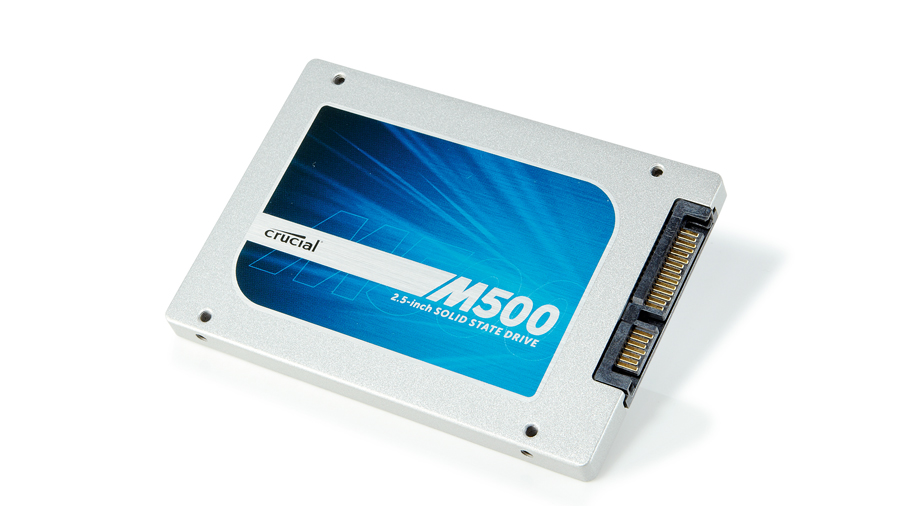TechRadar Verdict
Pros
- +
Great value for money
- +
Good performance
- +
Capacitors to stop drive errors with power cut
- +
Temperature monitor
Cons
- -
M4 series quicker in some benchmarks
Why you can trust TechRadar
Crucial's latest range of SSDs, replacing the highly successful M4 series, is here. The Crucial M500 family consists of four capacities: 120GB, 240GB, 480GB and the flagship 960GB. That top drive is the first terabyte-class SSD aimed at consumers, and it makes it one of the most important ranges to arrive on the market.
We're excited because it gives us a glimpse of what the future might hold when it comes to the cost-per-gigabyte pricing of SSDs. Crucial's new drives can do this because they use the latest development in NAND technologies - 128Gb (16GB per 2-bit MLC die) density chips. Why is this is so important?
Well, 128Gb density NAND holds the promise of allowing for large capacity SSDs at competitive prices in the consumer market space - something of a holy grail for SSD manufacturers.
To push home the advantage of this special high-density NAND, Crucial hasn't held back with its pricing, especially for the two largest capacities. The 480GB drive we're looking at here currently has a market price of around £300 / US$370 / AU$500, while the 960GB is an astonishing £500 / US$920 / AU$900. That works out at around £0.50/GB, making it a potential game changer.
But new NAND isn't the only thing the M500 brings to the table. It's also got a couple of other tricks up its sleeve - ones usually only found in proper enterprise SSDs. The good news here is that you get the added protection normally associated with enterprise devices in a drive that's aimed at us mere mortals.
First up, these drives have their own power backup. Looking at the drive's PCB, there are a couple of rows of capacitors, which - if the data is already in the NAND - enable the drive to finish any writing duties should your rig crash through power failure or some other BSOD moment.
There are also proper thermal controls, so if the temperature hits above 70C (158F), the drive will throttle back by around 40 per cent until it returns to a stable working temperature. The 480GB M500 uses 16 of those new NAND chips (eight per side of the PCB) with two dies per NAND package, giving it a total capacity of 512GB.
Crucial uses the spare capacity to sort out any NAND defects and its RAIN (Redundant Array of Independent NAND) technology. Looking after everything is a Marvell 91878 NAND memory controller, but the firmware is Crucial's own, and it's the natural development of the one written for the M4 drives.
Benchmarks
Sequential read performance
AS SSD: Megabytes per second (Bigger is better)
Crucial M500 480GB: 488
Crucial M4 512GB: 493
Kingspec Challenger E3000 80GB: 510
Seagate 600 480GB: 513
Sequential write performance
AS SSD: Megabytes per second (Bigger is better)
Crucial M500 480GB: 408
Crucial M4 512GB: 259
Kingspec Challenger E3000 80GB: 325
Seagate 600 480GB: 437
4K random write performance
AS SSD: Megabytes per second (Bigger is better)
Crucial M500 480GB: 59.6
Crucial M4 512GB: 83.1
Kingspec Challenger E3000 80GB: 18.3
Seagate 600 480GB: 54.4
Crucial quotes a sequential read speed for the 480GB drive of up 500MB/s (the same as all the other drives in the range), while the sequential write speed is quoted at 400MB/s. That is a tad on the conservative side when compared with the results we got from the ATTO benchmark - 539MB/s for sequential reads and 429MB/s for writes.
Verdict
Crucial's M500 series offers a glimpse of what the future might hold with the pricing of large capacity SSDs, and is a sign of how far the market has come in a short space of time.
If you'd have said barely a year ago that you'd be able to buy a 480GB SSD for under £300, several people in white coats would have escorted you to a nice padded cell.
